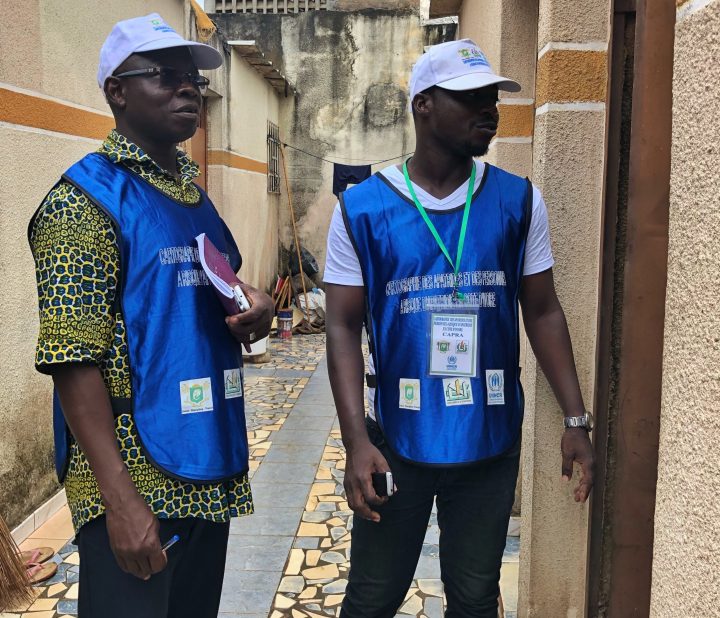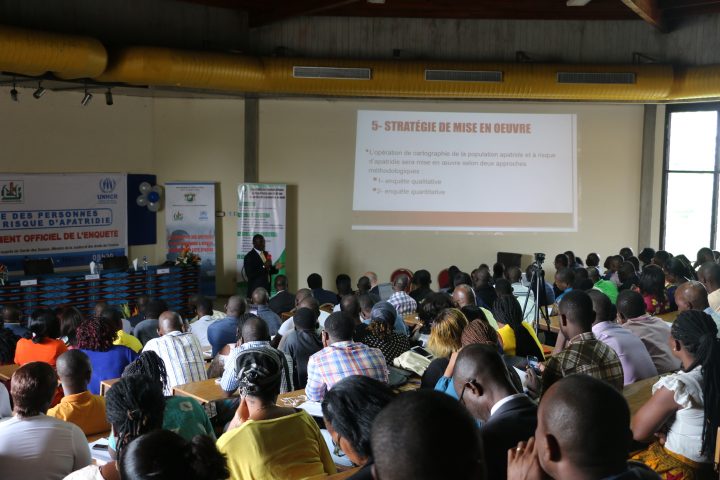By Layse Farias and Charlotte Arnaud
In August, an ambitious data collection exercise was jointly launched by UNHCR, the Government of Cote d’Ivoire, and the National Institute of Statistics (INS) to map and improve data on statelessness in the country.

An interviewer and his supervisor arrive at a household in downtown Abidjan. Each team interviewed an average of 20 households per day. Layse Farias/UNHCR
The nation-wide mapping, a first of its type in Africa, is in line with the overall policy of the Banjul Plan of Action of the Economic Community of West African States (ECOWAS) on the eradication of statelessness 2017 – 2024.[1]
This is not the first time the UNHCR office in Côte d’Ivoire has taken steps to improve data collection and identification of stateless persons and those at risk of statelessness. Prior to launching the mapping exercise, UNHCR published a study in November 2016 focusing specifically on the issue of statelessness. Named “Statelessness and Nationality in Côte d’Ivoire”, it identifies some of its key administrative and legal causes and provides information on the main profiles of stateless persons in the country. A second study, to be finalized in 2018, was also conducted with the support of INS and Statistics Norway and looks at the results from previous general population censuses to identify proxy factors for measuring statelessness.
Both the qualitative and quantitative studies have made recommendations for a nation-wide household survey as a way to improve raw data collection and understanding of the phenomenon on a country level.
“We need reliable data to design appropriate response plan for all the stateless person or those at risk of statelessness” explain Mohammed Askia Touré, UNHCR Representative in Cote d’Ivoire
The initial pilot phase of this data collection exercise lasted for around 10 days and included training of the interviewers, household counting, sample drawing and data collection within 10 different zones. The work has sparked off a lot of interest and from Headquarters UNHCR’s Field Information and Coordination Support Section supported the planning of the pilot.
Once the results came in, a few issues were identified such as difficulty in finding the households based on the government reference points (as many included restaurants and other businesses that no longer exist), finding people at home (most people working all day and only available in the evening) and reluctance of some interviewees to provide information they considered sensitive. Measures such as radio broadcasts in vernacular languages were since put in place in order to address these issues and improve communication around the operation before the official launch of the main phase of the operation that took place on August 1st.

The official launch of the mapping exercise took place in Abidjan on the 1st of August. Daouda Guirou/UNHCR
By August 17tharound 120 civil registry trained staff had begun data collection for both the qualitative and quantitative aspects of the exercise. Around 9000 households are expected to be interviewed during a period of roughly 50 days.
Côte d’Ivoire is home to one of the largest populations of stateless persons in the world. As such, persons unable to prove their nationality also find it challenging to access basic rights and services, such as go to school, see a doctor, open a bank account, get a formal job, travel, or even get married.
The two main groups concerned in Côte d’Ivoire are historic migrants and their descendants, who have lost ties to their country of origin over the generations as well as foundlings[2], or children of unknown parentage. Strict nationality laws, migration and low levels of birth registration all contribute to the incidence of statelessness in the country.
The government has taken steps to address the issue, by acceding to the two Statelessness Conventions in 2013 and reintroducing, under Law 2013-653 a special nationality acquisition by declaration program that remained in place until January 2016. However, challenges still remain and UNHCR is working closely with government authorities to improve birth registration records, support individual documentation, and address the foundlings’ issue.
The results of the mapping exercise should be available by the end of 2018. The data collected will help gather socio-demographic, economic and cultural information on this population and help the Government and UNHCR design appropriate solutions for the estimated 693 000 stateless and at risk of stateless persons living in the country.
Click here to know more about UNHCR’s work in Cote d’Ivoire.
—
[1] The Strategic Objective 2 of the Banjul Action Plan encourages States to strengthen data management systems for effective response to the challenges of statelessness.
[2] Foundlings are children of unknown parents. As they are unable to prove their filiation to at least one Ivorian parent, which is the main criteria for nationality acquisition in Côte d’Ivoire, they are at heightened risk of statelessness.
